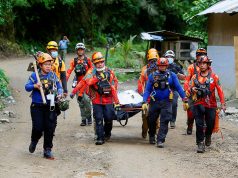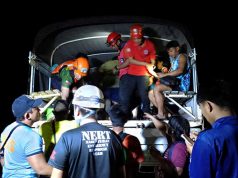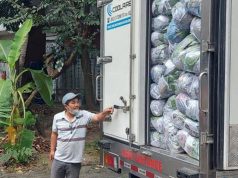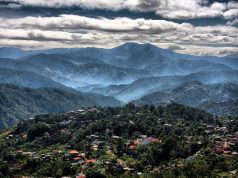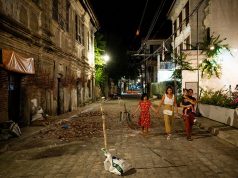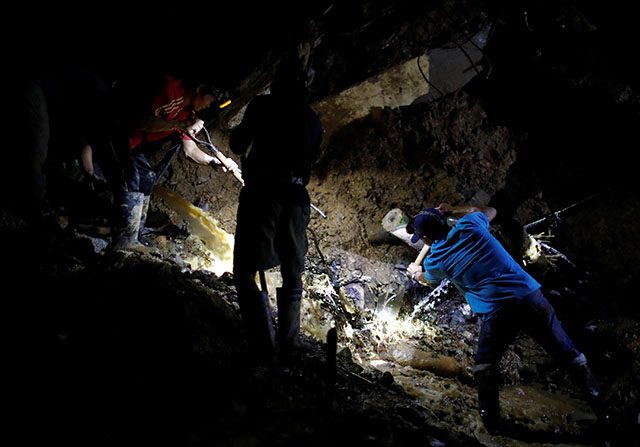
UCAB — Hopes of finding survivors in the rubble of a huge landslide in the Philippines faded on Monday as rescuers in a remote mountainous region struggled to reach dozens of people feared trapped, two days after a powerful typhoon struck.
Some 300 police, soldiers, firefighters and volunteers armed mostly with hand tools raced to remove rocks, mud, debris and drain water from collapsed buildings, hoping to find some signs of life after 13 bodies were pulled out.
The village of Ucab in the picturesque Cordillera region was hit by one of 50 landslides triggered by heavy rains brought by Typhoon Mangkhut, which tore across the northern tip of the Philippines early on Saturday, killing at least 54 people.
Only three people have been rescued in Ucab. Fifty-five were missing, six of them children. Many of the adults were in an abandoned bunkhouse, next to a chapel and home of a pastor and his family. The buildings were all crushed by earth and rocks.
“I am 99 percent sure the people there are dead,” said Victorio Palangdan, the municipal mayor. “We will continue until we get them all.”
Rescuers used bare hands to remove roofing, slabs of concrete and planks of wood, standing side-by-side, passing debris along a line to a pile 50 feet away.
The abandoned bunkhouse, owned by gold miner Benguet Corp., was near the site of a mine which was operating illegally, according to the Chamber of Mines of the Philippines.
The chamber, of which Benguet Corp. is a member, said mining operators in Ucab had been repeatedly told to leave the area because of the threat of landslides.
Angered by the deaths from landslides that some government officials say are exacerbated by illegal mining, President Rodrigo Duterte on Monday reiterated his desire to “close all mining”.
His environment minister, Roy Cimatu, earlier ordered the stoppage of all small-scale mining in the Cordillera region, where landslides had killed 24 people.
“From what I see, this will take time. We are unaware how deep they were buried,” said Peter Negrido, who has been involved in numerous rescue missions during natural disasters.
Roads impassable
The typhoon affected about five million Filipinos altogether, 150,000 of whom were in evacuation centers when the storm hit, packing winds of over 205 km (127 miles) per hour, and gusts of as much as 305 kph.
Mangkhut destroyed rice and corn crops worth an estimated $177 million and damaged 450 homes, with flooding in nine provinces, official estimates showed. The human cost was far less than disaster officials had anticipated.
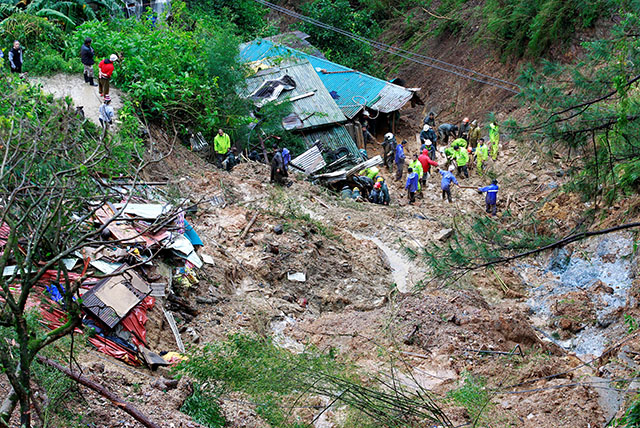
Road access to Ucab, a remote village about 18 km from the northern city of Baguio, has been cut off since rains triggered landslides, which were by far the biggest causes of casualties in Mangkhut’s wake.
Emergency responders have since Saturday afternoon been accessing the area on foot, and have no heavy-duty equipment. Buzzes of chainsaws were heard in the distance as workers tried to remove trunks of felled trees.
National Police Chief Oscar Albayalde in a Twitter message on Monday said elite police officers were being sent to the site with radar life detectors, harnesses, digging tools and other search and rescue equipment.
Friends and relatives joined lines of rescuers to remove debris, one rock at a time, as a handful of sniffer dogs searched for survivors.
Two bodies were pulled out from the collapsed building on Monday, taken by stretcher and placed next to an area used for panning gold.
“Heavy equipment can’t come in because the access roads were affected by the landslide,” said Helder Sikwan, 25, a trainee policeman.
“There are no signs of life. The order for us was to conduct search and retrieval operations.” — Additional reporting by Manolo Serapio Jr and Manuel Mogato in Manila; Writing by Martin Petty; Editing by Chris Cushing




